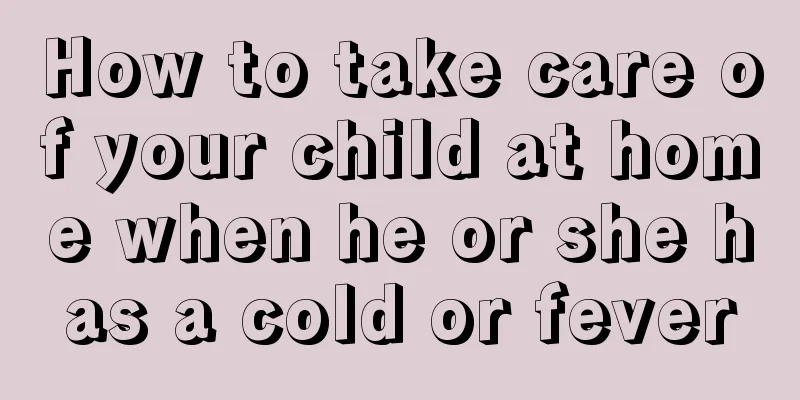Can babies mix medicine with milk powder? How should babies take medicine?

|
When babies are young, they are weak and have poor resistance, so it is inevitable that they will have headaches and fevers. Today, I want to introduce to you the best way to feed medicine to babies when they are sick. Can you mix medicine with milk powder and feed it to babies? Please see below. Can I mix medicine into milk powder?It is not recommended to do this. Children always catch a cold or get sick. Many children are afraid of taking medicine when they are sick, and mothers will be very distressed about feeding the medicine. So some mothers are smart enough to use milk powder to give the medicine to their children, but they don’t know that this will reduce the efficacy of the medicine and is not conducive to the child’s recovery. It is not recommended to take milk powder and medicine together. Giving medicine with milk powder can also cause trace elements in the milk powder to react with elements in the medicine, generating new substances that are not conducive to human digestion and absorption, affecting the health of infants and young children. Some medicines can even be destroyed by the ions contained in milk, reducing the concentration of the medicine in the blood, which will also reduce the efficacy and affect the recovery of the disease. Note: It is not recommended to feed medicine with a bottle It is not recommended to use a bottle to feed medicine to babies, especially for infants over 3 months old, so as to avoid the baby having an unpleasant experience with the bottle and then resisting drinking milk. You can use a spoon to feed medicine. If the baby cannot swallow, a syringe or dropper is also a good choice. Another way to say medicationIt is difficult to feed medicine to children. You can put it in milk powder, because no matter whether you put it in milk powder or not, the medicine will still mix with the milk in the stomach. Because babies only eat milk. It is recommended that you use the medicine under the guidance of a doctor. In addition, this symptom of the child should prevent intestinal obstruction. It is recommended that you observe the child's stomach frequently to see if it is tense. If the child cries, scratches the stomach with his hands, and the stomach is tense and not soft, it is recommended to see a doctor immediately, as there is a possibility of intestinal obstruction. Tips for feeding medicine to babiesChildren are reluctant to take medicine because it tastes bitter. Young parents are often anxious because they lack experience in feeding medicine. Whether it is medicine for infants or young children, parents try to reduce the bitterness of the medicine; if it is a tablet, grind it into powder and mix it with an equal amount of white sugar, or dissolve the medicine in a little sugar water; for powdered medicine that is insoluble in water, mix it with sugar first, so that the powder adheres to the sugar particles, then put it in a spoon and dissolve it with water; for oily medicines, such as cod liver oil, drip it on steamed buns, bread or biscuits and other foods that children like to eat, and eat them together. If the child refuses to take the medicine, the only way to force the medicine in is to force the child to take it. But you can't be reckless, and you can't leave a bad stimulation to the child, so as not to make him more disgusted with taking medicine in the future and cause suffocation. Even if you force the medicine in, you must pay attention to the method. Let the child lie on his back, tilt his head slightly to one side, pinch his cheek with his hand, and then feed him some water with a spoon. For sensible children over 3 to 4 years old, there is no need to force the medicine in. Parents should conduct positive education, explain clearly that if you are sick, you can only recover your health by taking medicine and injections, and encourage and praise taking medicine as a brave behavior. You can also prepare some of the child's favorite food in advance as encouragement after taking the medicine; or use the brave behavior of the neighbor's children taking medicine to induce in the form of storytelling, eliminate the child's fear, and make him take the medicine actively. When the child is disobedient, you must never scare the child with the language of injections and taking medicine. This will create a bad impression and increase the difficulty of taking medicine in the future. Do not put medicine in milk for your baby as it will change the nature of the medicine. |
Recommend
Is Johnson & Johnson a domestic brand? Is Johnson & Johnson owned by Procter & Gamble?
The Johnson & Johnson brand is still quite po...
Which brand of mother's bag is good? What should be in the mother's bag?
After having a baby, you need to bring all kinds ...
Does emotion affect pregnancy? Does bad emotion affect pregnancy?
Will bad mood affect pregnancy? Many people are v...
Which is better, Diqiao or Caltrate? How to take Caltrate calcium carbonate d3 tablets
Newborns need to supplement calcium nutrition a f...
At what age can a baby eat by himself? How to make a baby love eating?
Learning to eat by yourself is a stage that your ...
How long does it take to cut a newborn's hair? Can a newborn's hair be cut?
Newborns are very fragile, and many of their dail...
Can patients with asthenospermia do IVF? Can patients with asthenospermia undergo artificial insemination?
Many men with asthenozoospermia have been unable ...
Why is it that one eye is bigger than the other? Be alert to these four possibilities
Eyes are the most important organ in the human bo...
What are the symptoms of urinary tract infection in babies? What should I do if my baby has a fever due to urinary tract infection?
Urinary tract infection is one of the common urin...
What are the early symptoms of meningitis in children?
Newborns are prone to illness due to their reduce...
Is there still milk after abortion during breastfeeding? How to increase milk after abortion during breastfeeding?
Abortion during breastfeeding will have a certain...
How to prepare baby rice cereal? How many milliliters of water should be added to one spoon of rice cereal?
Baby rice cereal is a very common baby food. Gene...
What should you pay attention to when visiting a newborn baby?
If you want to visit a friend who has just given ...
Why do foreigners like to adopt Chinese children? There are many abandoned babies in China
In China, many children are abandoned by their pa...
Why does a pregnant woman have diarrhea after eating pears? What can I eat if I have stomach pain during early pregnancy?
First-time pregnant mothers will be somewhat at a...









